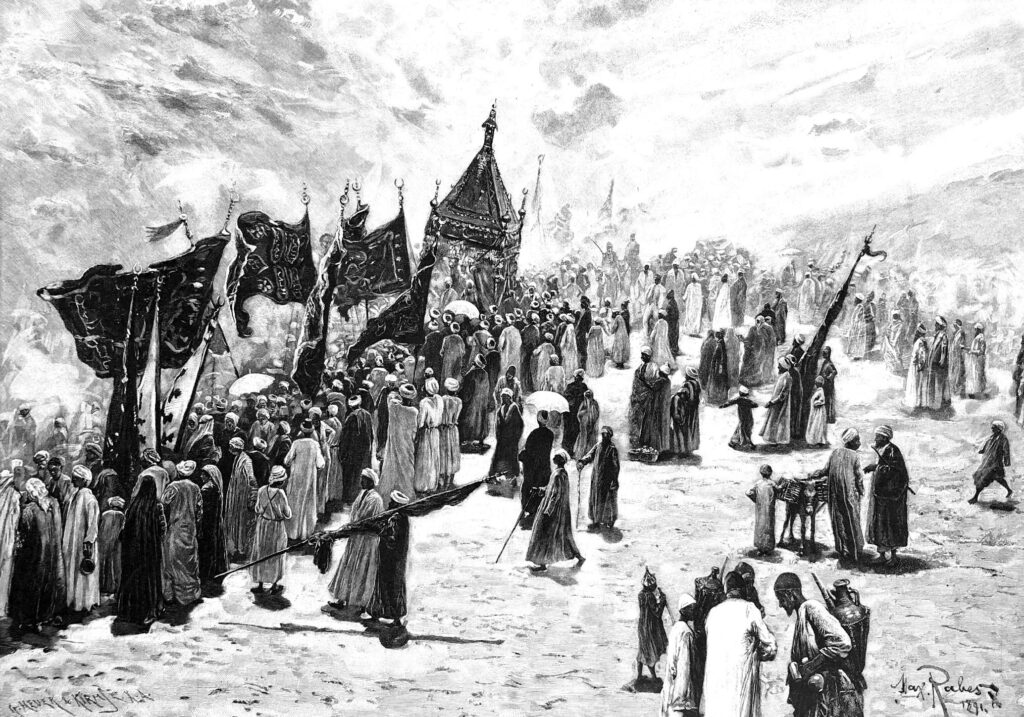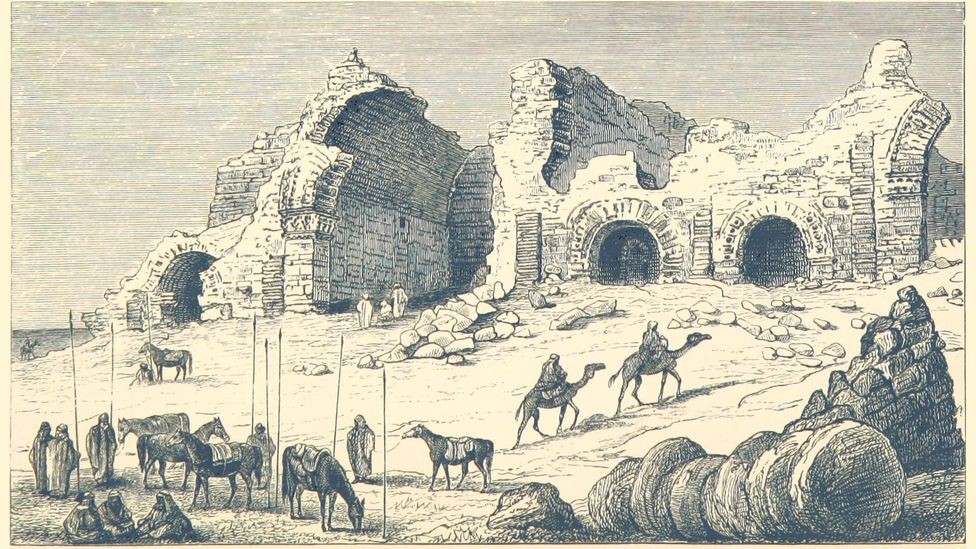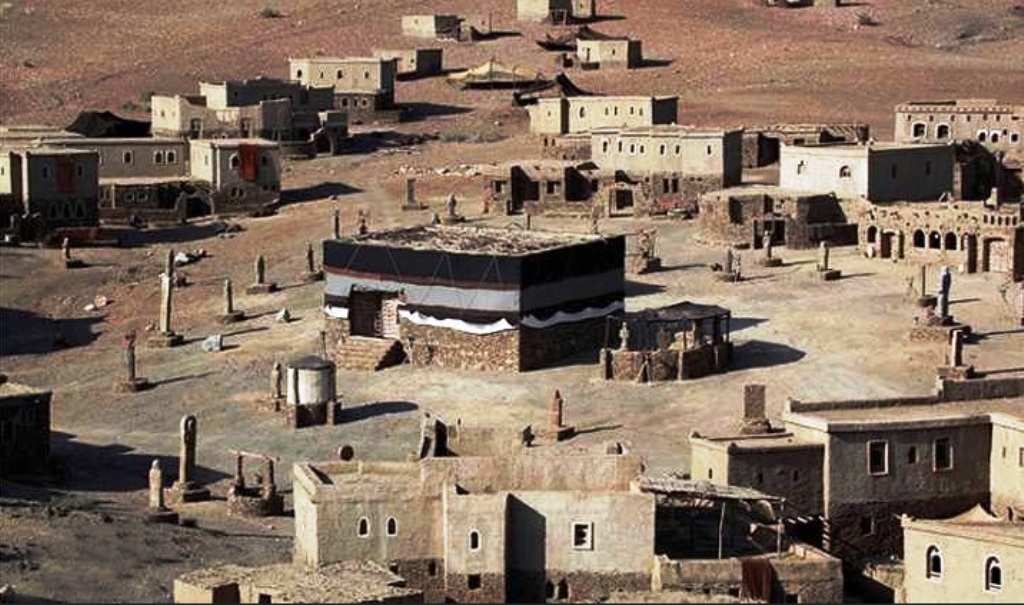
TRIBES INVITED TO ISLAM
Thereafter the Prophet (r) started convening the members of different tribes who came
to Makkah for the pilgrimage.
He used to explain to them the doctrine of Islam and to solicit support in his mission.
He often told the tribesmen.
“O ye people, I have been sent to you as the Messenger of God (r) for asking you to worship Him, to call on you to associate nothing with Him and to renounce everything you have elevated as His co-equal. Believe in God and His Prophet (r) and protect me until I have explained that which God has sent to me.”
Whenever the Prophet (r) counseled any tribe and finished talking to it, Abu Lahab usually stood up to say,
“O ye people, this fellow wants you to cast off your obedience to and Al-Uzza and your allies, the Jinn and to exchange your Gods from the wickedness and innovation he has brought. Don’t take orders from him nor pay any heed to him.
Risky Path of Islam
The way leading to Allah and Islam was becoming ever more dangerous. Makkah had become so unsafe and vulnerable for the Muslims that acceptance of Islam meant taking one’s life in one’s hand.
The story of Abu Dharr Ghifari’s conversion to Islam as told by ‘Abdullah Ibn ‘Abbas shows
how perilous it had become even to call upon the Prophet (r) in those days.
“When Abu Dharr heard of the advent of the Prophet (r) , he said unto his brother:
‘Proceed to that valley and enlighten me about the man who claimeth to be a Prophet (r) and to receive communication from Heaven.
Listen to some of his sayings and then return unto me.’
So the brother went forth, reached the Prophet (r) and heard some of his sayings.
Thereafter, he returned to Abu Dharr and said unto him:
‘I found that he enjoined the highest principles of morality and that his speech is not poetry.’ – But (Abu Dharr) said:
Youhave not been able to satisfy me.
“Thereupon he took some provisions, together with an old waterskin full of water, and
proceeded to Makkah.
Then he went to the mosque (K’aba) and began exploring for the Prophet (r) for he knew him not and was reluctant to ask about him and thus he spent part of the night.
Thereupon ‘Ali saw him and recognized the same to be a stranger and when Abu Dharr met ‘Ali, he went with him (to the latter’s house).
Until daybreak, neither of the two asked any questions of each other. Then once again he (Abu Dharr) went with his waterskin and his provisions to the mosque and allowed that day to pass ‘til evening without finding the Prophet (r), although the latter saw him from there.
Then he returned to his resting-place. While in there, ‘Ali passed by him and said:
“Is it not time that a man should know his abode?” And his remarks made him rise and finally brought him to his house, with neither of the two asking any questions of each other, too.
And on the third day ‘Ali did likewise, and he (‘Abu Dharr) stayed with him.
Thereafter ’Ali said: “Will you not tell me what had brought you here?”
Abu Dharr answered: “I will do so only if you promise me that you will guide me right”,
whereupon ‘Ali agreed outright. After that, Abu Dharr told him all.
Then, ‘Ali said: “Behold, it is true, and he is indeed an Prophet (r) of God!
Tomorrow morning, you follow me.
If indeed I see any danger for you, I will stop as if to pass water; but if I go on, then follow me and enter in whichever place I do.”
Abu Dharr did so, following ‘Ali until he finally found the Prophet’s house and entered in it together with him ‘Ali. Then he listened to some of the Prophet’s sayings and embraced Islam on the spot.
Thereupon the Prophet (r) said unto him:
“Return unto your people and inform them about me and await my bidding.”
After which, Abu Dharr said: “By Him in whose hand is my soul, indeed I shall loudly proclaim the truth among them!”
Then he left and went to the mosque and called out at the top of his voice.
He proceeded to say:
“I bear witness that there is no deity but God, and that Muhammed is His Prophet (r).”
Thereupon, the people of Makkah broke upon him, beat him and then threw him into the ground. At such juncture, Al-‘Abbas came, knelt down to see him and said to the people:
“Woe unto you, know ye not that he belongeth to the tribe of Ghifar and that your merchants’ road to Syria passeth through their country?”
Thus, Al-‘Abbas rescued him from them.
That incident did not stop Abu Dharr from doing the same thing again,
prompting the people (of Makkah) to impose themselves over him anew
,whereupon Al-Abbas came once more to his redemption.” (Al-Bukhaari, Section: Abu Dharr’s conversion to Islam).
Beginning of Islam among the Ansar

The Prophet (r) met some of the people from the town of Yathrib (Madinah) belonging to
the trbe Khazraj at ‘Aqabah
when he went to preach Islam to the tribes throughout the tenure of pilgrimage.
He told them about Islam and called on them to serve God alone, reciting some Qur’anic verses in the process. As these people lived in Yathrib side by side with the Jews who often told them that a Prophet of God was soon to come, they said to one another:
“By God, this is the same thing that the Jews informed us; Lo, nobody should now get ahead of you.”
Thereupon they accepted his teachings and embraced Islam. They also said to the Prophet (r),
“When we left our people, conflict and hatred divided them more than any other. Perhaps God will unite them through you. We shall inform them to accept this religion of yours which has been accepted by us, and if God unites them on you, then no man shall be honored more than you.”
These men returned to their homes after accepting Islam,where they told others about the Prophet (r) and invited them to accept the new faith.
Islam quickly spread in Madinah until there was no home left of the Ansaar (“supporters” as the people if Madinah were to be known) wherein the Prophet (r) was not mentioned.
FIRST PLEDGE OF ‘AQABAH

At the pilgrimage the next year, twelve men belonging to the Ansaar met the Prophet (r) at ‘Aqabah.
They pledged themselves to the Prophet (r) vowing neither to commit theft nor fornication, nor to kill their children, to obey him in what was right, and to associate nothing with God.
When these people left Madinah, the Prophet (r) sent Mus’ab Ibn ‘Umayr with them to teach the Qur’an to the people there as well as to expound Islam and instruct them about the religion;
wherefore ‘Umayr came to be called “The reader” in Madina.
He lived with As’ad Ibn Zurara and also led prayers.
THE REASON FOR ANSAAR’S ACCEPTANCE OF ISLAM
It was a critical juncture when God afforded the opportunity of helping and defending Islam to the Aus and the Khazraj, the two influential tribes of Yathrib. For there was nothing more precious at the moment than to own and accept Islam, they were really fortunate in getting the most relevant and timely opportunity to take precedence over all other tribes of Hijaz in welcoming and defending the religion of God.
They overshadowed their compatriots since all the tribes of Arabia, in general, and the Quraysh, in particular, had proven themselves ungrateful as well as incompetent to take advantage of the greatest favor bestowed upon them.
“And Allah guides whom He wills to a straight path”
[Qur’an (2:213)]
Diverse causes and circumstances, proceeding from the will of Almighty God, had opened the door for the acceptance of Islam by the Aus and the Khazraj.
These tribes were not of the Makkahn Qurayshites type for unlike them, the Aus and the Khazraj were kind-hearted and sweet-tempered, immune from the Qurayshite traits of immoderation, stubbornness and vanity, and hence they were responsive, open to reason.
These were the characteristics inherited from their progenitors, the Yemenites, about whom the Prophet (r) had remarked after meeting one of their deputations: “The people of Yemen have come to you, and they have the tenderest hearts.”
Both these tribes of Yathrib originally belonged to Yemen for their forefathers had come down from there. Commending the merits of these people, God has said in the Qur’an:
“Those who entered the city and the faith before them love those who flee unto them for refuge, and find in their breast no need for that which hath been given them, but prefer the fugitives above themselves though poverty becomes their lot.” [Qur’an 59:9]
Another reason was that continuous internecine fighting had already exhausted both tribes.
Enervated and distracted by the famous battle of Bu’ath fought a short time ago (about 615 AD), the said tribes were desirous of peace and harmony and wanted to avoid renewal of warfare.
Such was their anxiety for peace that the first Muslims of Madinah had said to the Prophet (r),
“When we left our people, discord and conflict and enmity divided them more than any other.
Perhaps God will unite them through you, and if God unites them on you, then no other man will be more than honored as you do.”
‘Aisha once said that the battle of Bu’ath was really a divine intervention
and a blessing in disguise which served as a prelude to the Prophet’s migration to Madinah.
Yet another reason was that the Quraysh,like the rest of the Arabian tribes, had for a long time lost touch with Prophethood and the Prophets and had hardly any recollection of their teachings.
Deeply immersed in ignorance and idolatry as well as being completely strangers to the arts of reading and writing, they had become overzealous heathens; actually,
they had but little contacts even with the Jews and Christians, the followers of the Prophets and their scriptures (although these had since been distorted).
This was plain, plum fact to which the Qur’an makes a reference in these words:
“In order that you may warn a people whose forefathers were not warned, so they are heedless“
[Qur’an (36:6)]
But the Aus and the Khazraj were neighbours of Yathrib Jews whom they heard talking
about the Prophets and reciting their scriptures.
The Jews often thereatened them that a Prophet (r) was to come in the later times with whom they would ally themselves and kill the heathens just as the people of ‘Ad and Iram were massacred.
(Tafsir Ibn Kathir, Vol. I, p. 217)
“And when there cometh unto them a Scripture from Allah, confirming that in their possession – though before disbelieved – and when there cometh unto them that which they know (to be the Truth) they disbelieve therein. The curse of Allah is on disbelievers.” [Qur’an (2:89)]
Aus and Khazraj as well as other Arab tribes settled in Madinah were heathens like the idolatrous Quraysh and the rest of the Arabs.
But unlike them, they had become accustomed to the idea of revelation in the form of a scripture of supernatural origin, prophecy, Prophetship, inspiration, requital and the hereafter.
This was courtesy of their uninterrupted association with the Jews of the city from whom they had business transactions, made war and peace and lived side by side.
They had, thus, come to know the teachings of the Prophets of old and the reason why God sends them from time to time. This was of great advantage to these people, for, when they learned about the Prophet (r) on the occasion of Hajj at Makkah, they at once grabbed the opportunity as if they were already prepared for it.
for prophets stories visit https://sunofislam.com/prophetsofgod/
for scientific miracles articles visit www.sunofislam.com

[…] Prophet’s prayers for Abu Zaid Al-Ansari […]
[…] THE SECOND PLEDGE OF ‘AQABA […]